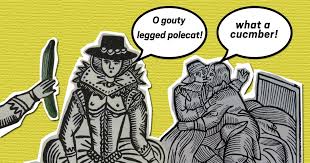John Spurr at HistoryExtra:
 In Henry IV, Part One, Shakespeare’s Hotspur turns on his prissy wife: “Heart! You swear like a comfit-maker’s wife. ‘Not you in good sooth!’ and ‘as true as I live!’”. Instead Hotspur demanded a good mouth-filling oath. Something like his own “By God’s heart” was more suited to a lady of rank.
In Henry IV, Part One, Shakespeare’s Hotspur turns on his prissy wife: “Heart! You swear like a comfit-maker’s wife. ‘Not you in good sooth!’ and ‘as true as I live!’”. Instead Hotspur demanded a good mouth-filling oath. Something like his own “By God’s heart” was more suited to a lady of rank.
The oaths of the Tudor and Stuart centuries, the era of Shakespeare (1564–1616), still jump out at modern readers from plays, courtroom testimonies and countless other sources. And they strike us as very different from our own bad language. Swearing – solemn or profane – was a religious issue: an oath called on God to guarantee the truth of a statement, just as profane swearing took God’s name in vain.
Swearing supposedly ran along the lines of social status and gender. And swearing was always something of a performance.
more here.
